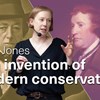manchester
Theoretically and empirically informed agent-based models
Johan Koskinen, University of Manchester Theoretically and empirically informed agent-based models and how it may be employed in Social Science.
Human enhancement and technological uncertainty
Defending the dissertation Human enhancement and technological uncertainty. Essays on the promise and peril of emerging technology by Karim Jebari. Dissertation in Philosophy at KTH in Stockholm. Opponent

Ane Engelstad
I am a postdoctoral reseach fellow in practical philosophy at the University of Bergen. In my research, I show that key arguments from feminist epistemology can lead to new insights in political philo we should approach doing political philosophy more broadly.
Emily Jones: Afterlives: Edmund Burke, Benjamin Disraeli, and the Invention of Modern Conservatism
Venue: Institute for Futures Studies, Holländargatan 13 in Stockholm or online Research seminar with Emily Jones, Lecturer in Modern British History at the University of Manchester. Register here > Abs

Emily Jones: Edmund Burke, Benjamin Disraeli, and the Invention of Modern Conservatism
This paper will explore key findings drawn from my first monograph, Edmund Burke and the Invention of Modern Conservatism, 1830-1914: An Intellectual History (OUP, 2017) and my forthcoming book, One N
Rainer Bauböck: Globalization, new technologies and the future of democratic citizenship
Professor of Social and Political Theory, European University Institute. ABSTRACT Liberal democratic citizenship has been shaped by the legacies of Athens (democracy) and Rome (legal rights) but operate between individuals and states. In a Westphalian world, citizenship has both instrumental and identity value. Enhanced opportunities and interests in mobility rights strengthen instrumental interests in multiple citizenship among immigrants, among populations in less developed countries, and among wealthy elites. The latter two trends potentially undermine a genuine link norm and, if they prevail, might replace the Westphalian allocation of citizenship with a global market. New digital technologies create a second challenge to Westphalian citizenship. As has argued, digital identities could provide a global legal persona for all human beings independently of their nationality, and blockchain technologies could enable the formation of non-territorial political communities providing governance services to their members independently of states. Both the instrumental uses of citizenship for geographic mobility and technologies that create substitutes for territorial citizenship are not merely relevant as current trends. They are also advocated and defended normatively as responses to the global injustice of the birthright lottery. I will challenge this idea and argue that liberal democracies should not be conceived as voluntary associations whose membership is freely chosen, but as communities of destiny among people who have been thrown together by history and their circumstances of life. How these foundations of democratic community can be maintained in the context of rising mobility and the digital revolution remains an open question.








